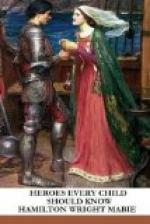Bred in the vigorous school of frontier warfare, “the earth for his bed, his canopy the heavens,” Washington excelled the hunter and woodsman in their athletic habits and in those trials of manhood which filled the hardy days of his early life. He was amazingly swift of foot, and could climb steep mountains seemingly without effort. Indeed in all the tests of his great physical powers he appeared to make little effort. When he overthrew the strong man of Virginia in wrestling, upon a day when many of the finest athletes were engaged in the contest, he had retired to the shade of a tree intent upon the reading of a book. It was only after the champion of the games strode through the ring calling for nobler antagonists, and taunting the reader with the fear that he would be thrown, that Washington closed his book. Without taking off his coat he calmly observed that fear did not enter his make-up; then grappling with the champion he hurled him to the ground. “In Washington’s lion-like grasp,” said the vanquished wrestler, “I became powerless, and went down with a force that seemed to jar the very marrow in my bones.” The victor, regardless of shouts at his success, leisurely retired to his shade, and again took up his book.
Washington’s powers were chiefly in his limbs. His frame was of equal breadth from the shoulders to the hips. His chest was not prominent but rather hollowed in the centre. He never entirely recovered from a pulmonary affection from which he suffered in early life. His frame showed an extraordinary development of bone and muscle; his joints were large, as were his feet; and could a cast of his hand have been preserved, it would be ascribed to a being of a fabulous age. Lafayette said, “I never saw any human being with so large a hand as the General’s.”
Of the awe and reverence which the presence of Washington inspired we have many records. “I stood,” says one writer, “before the door of the Hall of Congress in Philadelphia when the carriage of the President drew up. It was a white coach, or rather of a light cream colour, painted on the panels with beautiful groups representing the four seasons. As Washington alighted and, ascending the steps, paused on the platform, he was preceded by two gentleman bearing large white wands, who kept back the eager crowd that pressed on every side. At that moment I stood so near I might have touched his clothes; but I should as soon have thought of touching an electric battery. I was penetrated with deepest awe. Nor was this the feeling of the school-boy I then was. It pervaded, I believe, every human being that approached Washington; and I have been told that even in his social hours, this feeling in those who shared them never suffered intermission. I saw him a hundred times afterward but never with any other than the same feeling. The Almighty, who raised up for our hour of need a man so peculiarly prepared for its whole dread responsibility, seems to have put a stamp of sacredness upon his instrument. The first sight of the man struck the eye with involuntary homage and prepared everything around him to obey.




